- Braun & Brains
- Posts
- The fund with Anduril tattoos, Thiel ties, AngelList vets, and Mark Zuckerberg’s sister backing "magical weirdos".
The fund with Anduril tattoos, Thiel ties, AngelList vets, and Mark Zuckerberg’s sister backing "magical weirdos".
Also, beta blockers, government workers on Reddit, and getting paid $5,000 to move to Noblesville, Indiana.
Braun & Brains is my personal outlet where I cover tech, business, and adjacent topics. Need production, insights, or a fresh perspective for your podcast or social media? Let’s talk.
I took an Amtrak to my parents' house in Maryland and brought my cat, which meant most of my time was spent worrying about her vibrating in her little backpack on the floor. She meowed. The. Entire. Time. My cortisol levels were through the roof. I felt awful for my fellow riders trying to listen to their podcasts and read their Kindles. At one point, I just sat with her in the bathroom (backpack and all) so people could have some peace.
If anyone knows how to handle this situation, please, for the love of silence, let me know.
Because my cortisol levels spiked to record highs during that ride, my laptop barely made an appearance, and I spent most of my time scrolling Substack and the news on my phone. This issue is news-heavy and was written partially from the Amtrak bathroom… excuse the typos.
Let’s get into the newsletter…
Brain Food: Beta Blockers and the Business of Calm
Becca Law’s latest Substack sent me down a rabbit hole about beta blockers as the drug of burnout culture—and it got me thinking about how tech startups are turning them into a business.
Beta blockers aren’t new. They’ve been around for decades, prescribed for heart conditions, anxiety, and migraines. By blocking adrenaline, they physically mute symptoms of stress—no shaky hands, no racing heart, no flop sweat. That’s why musicians, actors, and high-stakes professionals have quietly relied on them for years.
But now, thanks to startups like Kick and Hims and Hers, beta blockers are being repackaged as a modern confidence booster for everyday use. Forget about prescriptions for medical conditions—these companies are marketing propranolol as a pre-game ritual for big meetings, first dates, and anything else that requires keeping your cool.
In her Substack Pretty in Person, Becca Law makes the case that beta blockers are the drug of burnout culture, just as Adderall once fueled hustle culture.
“The appeal of Adderall was hyper-productivity—limitless energy, laser focus. Beta blockers are the opposite. The appeal isn’t doing more, it’s feeling less. If Adderall was the drug of hustle culture, beta blockers are the drug of burnout culture.”
She’s right. While Adderall was about enhancing performance, beta blockers are about enduring it. The same pharmaceutical giants that pushed stimulants as a workaholic’s best friend are now selling the other side of the equation—calm and composure, in pill form.
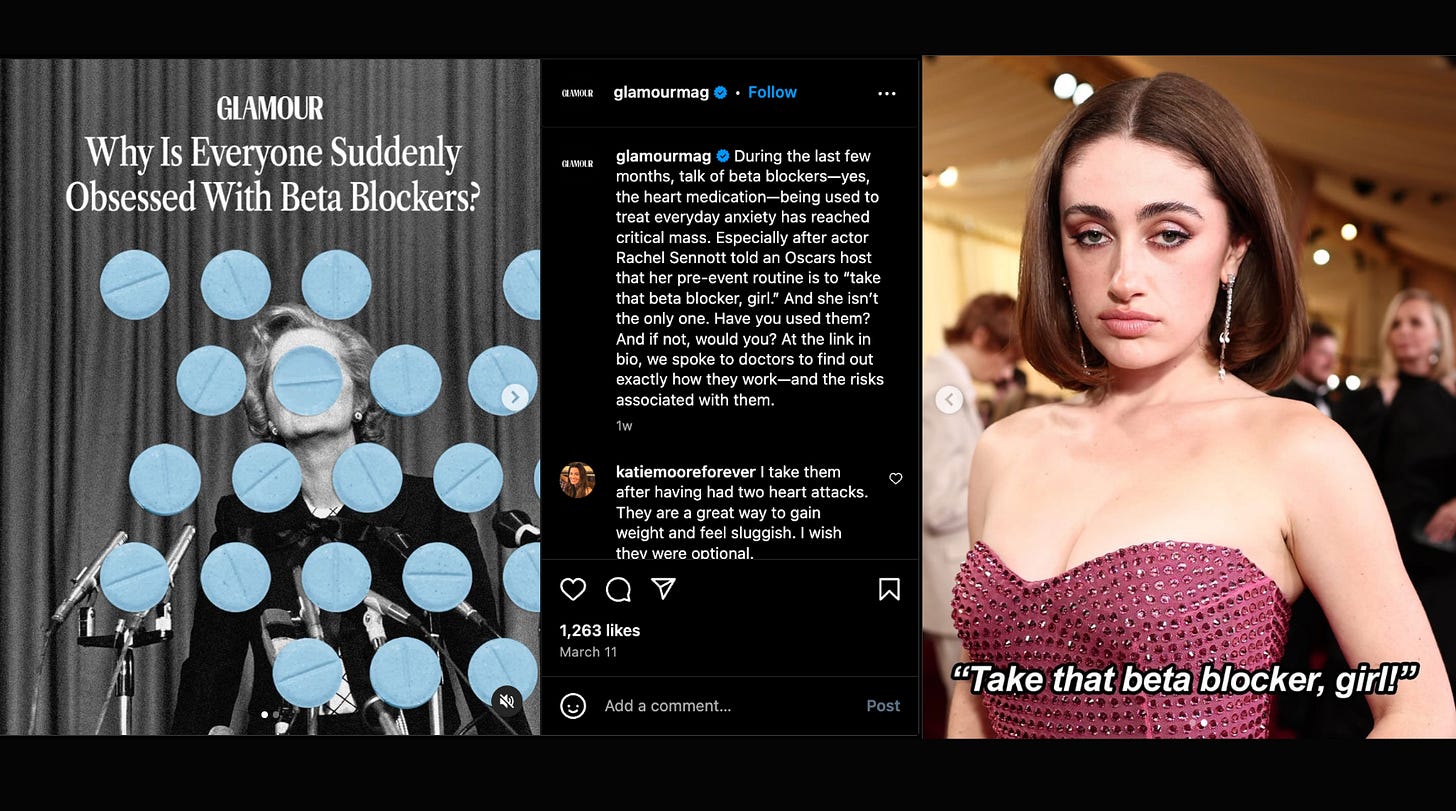
A recent post from Glamour on Instagram featuring the beautiful Rachel Sennott
The Rise of Beta Blocker Branding
Back in 2019, Bloomberg reported on how Kick, Hims, and Hers were selling propranolol with sleek, anxiety-free branding. No clinical, medical language—just a simple, easy fix for stress. Their messaging was clear: take a beta blocker and perform without fear.
It’s a familiar playbook. Prescription drugs start with a clear medical use, then get rebranded as a lifestyle product. Adderall went from treating ADHD to fueling ambition. GLP-1 injections went from diabetes management to weight-loss miracle. And now, beta blockers are being sold as the chill pill for modern life.

A quick scroll through what people and companies are saying about beta blockers.
What Happens When Calm Becomes a Commodity?
Beta blockers are generally safe in small doses, but the concern is why people are taking them. When a medication shifts from clinical treatment to cultural trend, risks tend to get downplayed while demand skyrockets. These startups say they follow medical guidelines, but their marketing leans heavily on the benefits while glossing over potential risks—like dangerously low blood pressure, drug interactions, and the reality that emotional numbness isn’t the same as real confidence.
It’s worth asking: Are beta blockers the real solution to modern anxiety, or just another stopgap in the cycle of medicated self-optimization? And if burnout culture isn’t going anywhere, what comes after beta blockers?
If you’re prescribed something and feel comfortable taking it, take it. I’m not a doctor, nor am I the ruler of your life. I have friends whose lives have been changed thanks to beta blockers. But if you’re feening for your next anxiety fix on the latest telehealth website… I think you should do some reflection.
Tech
You might not have heard of Long Journey Ventures, but you definitely know the team. The firm is led by Cyan Banister, a former partner at Peter Thiel’s Founders Fund; Arielle Zuckerberg, a former investor at Coatue (and yes, Mark Zuckerberg’s sister); and Lee Jacobs, a longtime AngelList investor. Banister, known for early bets on SpaceX, Uber, and DeepMind, has a reputation for backing out-there founders. She even tattooed the Anduril logo on her shoulder before the defense startup became a $28B giant. Jacobs has a track record of spotting unique early-stage deals like the ketamine mental health startup Mindbloom. Zuckerberg brings experience from big names like Google, Kleiner Perkins, and Coatue. They’ve also got Scott Banister, Cyan’s husband and an early PayPal investor, on board as a venture partner. Their latest fund is $181.8M, dedicated to finding and backing what they call “magical weirdos” (sounds like a millennial YouTube group) before everyone else catches on. Long Journey isn’t just about unconventional bets. It also has a distinct philosophy. The firm likens itself to a “bubbe” (Yiddish for grandmother), embracing both honesty and care. Jacobs describes their approach as a balance of compassion and realism, shaping decisions beyond investing. That includes where they take money from. Jacobs, who sees combating antisemitism as a core mission, said the firm declined funding from universities it believed didn’t support Jewish students during the Gaza war protests. (Bloomberg)

Dani Tustin, from left, Luke Qin, Mike Wang, Arielle Zuckerberg, Cyan Banister and Lee Jacobs at the Long Journey headquarters in San Francisco. (Michaela Vatcheva/Bloomberg.)
There are two very opinionated groups: those who actively avoid Reddit like the plauge and those who check it every morning like it’s the news. I was surprised which one of those groups government employees fell into. With federal job cuts looming, workers are heading to Reddit to share information, vent, and figure out what’s next. The r/VeteransAffairs subreddit, along with r/FedNews and others, has become a go-to space for people trying to make sense of layoffs, budget cuts, and shifting policies under the Trump administration. Moderators like David Carson, an Army veteran and former V.A. employee, are working overtime to keep discussions focused and useful. Anonymity makes it easier to speak freely, and with little official communication, Reddit has become an essential place for federal workers looking for real answers. (New York Times)
Related: Speaking of government employees, the Trump administration has issued an executive order to dismantle Voice of America (VOA), leading to employees being placed on paid leave and some broadcasts going offline or being replaced with music. VOA, a U.S.-funded international broadcaster, has historically provided news to audiences in countries with restricted media access. The administration has cited concerns over bias in its decision, while legal challenges and advocacy efforts are underway to support affected employees. Who is next on the chopping block? (New York Times)
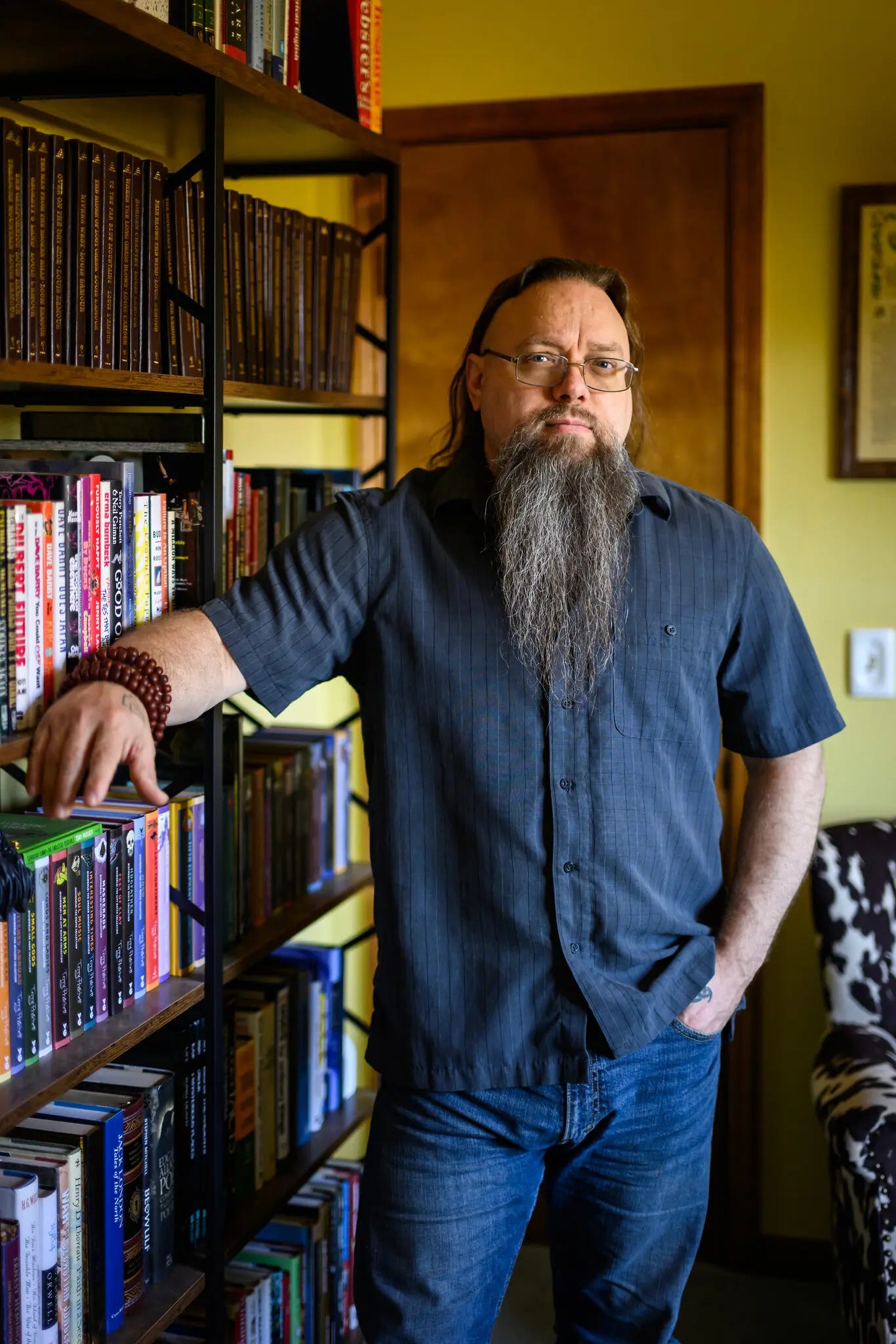
David Carson, a moderator of the Veterans Affairs group on Reddit. (William DeShazer for The New York Times)
Telegram has surpassed 1B active users, according to founder Pavel Durov, who also revealed the company generated $547M in profits last year. Durov took a direct shot at Meta-owned WhatsApp, calling it a “cheap, watered-down imitation” that has failed to slow Telegram’s growth. Meanwhile, Telegram continues expanding its appeal to businesses and crypto enthusiasts, integrating TON blockchain, decentralized apps, and a new verification system. Durov, recently cleared to return to Dubai after an investigation in France, remains focused on Telegram’s independence and profitability. (TechCrunch)
Will X become the next super app? Probably not—U.S. regulations make that tough. But maybe. Elon Musk’s X Corp is making a sharp comeback, reclaiming its $44B valuation after dropping below $10B last year. The rebound comes after nearly $1B in new funding, with Musk investing alongside firms like Darsana Capital Partners, Andreessen Horowitz, Sequoia, and Fidelity. X is using the cash to pay down debt, bring back advertisers, and expand into payments (X Money) and AI (xAI, targeting a $75B valuation). Investor confidence is rising, fueled by Musk’s political connections and his push to turn X into an “everything app.” Now, the company is focused on stabilizing its business and diversifying revenue. (Bloomberg, Financial Times)
Polymarket founder (and my X mutual) Shayne Coplan, dropped out of NYU and built a crypto-based betting platform where traders and meme investors wager on everything from March Madness to political outcomes. The site handled over $3B in election bets, sometimes predicting results before major networks and pollsters. But questions about its legality have put it under scrutiny. The FBI raided Shayne’s company, and its future is now uncertain. As Washington revisits gambling laws and crypto regulations, this New York Mag article explores whether he is a visionary pushing the limits… or just another entrepreneur testing the law. (New York Mag)
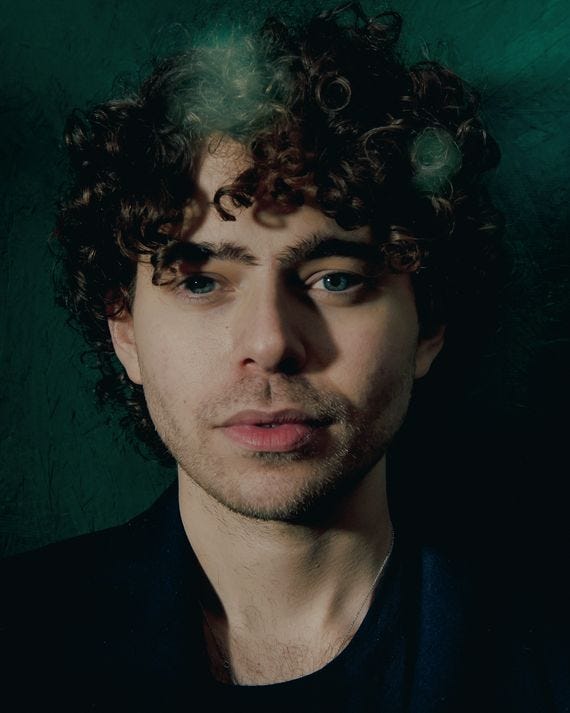
(Dina Litovsky, New York Mag)
Will Substack become a place where users flock for videos? I have no idea <3 What I do know is video posts on Substack have grown 135% over the past year, now making up 6% of all posts. While top creators are experimenting with video, a ton of writers are skeptical and see the shift as a threat to the platform’s focus on writing. Some compare it to Instagram’s move to Reels and say they would leave if Substack leans too far into video. The company says video is meant to complement writing, not replace it, and is actively recruiting video creators with incentives like the TikTok Liberation Prize. (Digidays)
Peter Yang can let you know what AI tool you should pay for. His opinion is interesting and helpful! (Creator Economy)
More tech bros are becoming leaders, and no I am not talking about TBP becoming the leaders in media. San Francisco Mayor Daniel Lurie is bringing tech and business leaders deeper into city politics with two new private sector driven initiatives. The Partnership for San Francisco, a mayoral council featuring execs like Sam Altman and Marc Benioff, will offer “CEO-level” policy input, while the San Francisco Downtown Development Corp, led by ex-Goldman Sachs official David Stiepelman, will use public and private funds to revamp the city’s business district. Modeled after New York’s Partnership for NYC, both groups have been operating quietly and are meant to outlast Lurie’s administration, raising some questions about transparency, accountability, and who’s really running the city. After Elon got close to the political game, we have to all admit we saw this coming. (San Francisco Standard)
Business
Nicotine pouches like Zyn, originally developed in Sweden to help women quit smoking, have exploded in popularity in the U.S., particularly among men in finance and my ex-boyfriends (not mutually exclusive). This article by New Yorker highlights that unlike cigarettes or vapes, these more discreet alternatives have been embraced as a lifestyle product, fueling camaraderie, political debates, and influencer-driven marketing. While Sweden has nearly eradicated smoking through snus, the U.S. has turned nicotine pouches into a cultural symbol, sparking concerns over addiction, regulation, and Big Tobacco’s evolving influence. As sales skyrocket, the question remains: are nicotine pouches a public health win or just another way to keep people hooked? (New Yorker)
Related: PMI bought Zyn’s parent company, Swedish Match, in 2022. Zyn has boosted PMI’s profits, earning $2B in U.S. revenue with higher margins than cigarettes. As U.S. smoking rates hit an 80-year low, PMI is focusing on smoke-free products, aiming for them to make up 67% of revenue by 2030. However, competition is growing, and PMI’s stock, while benefiting from Zyn’s success, faces market uncertainties. (Barrons)
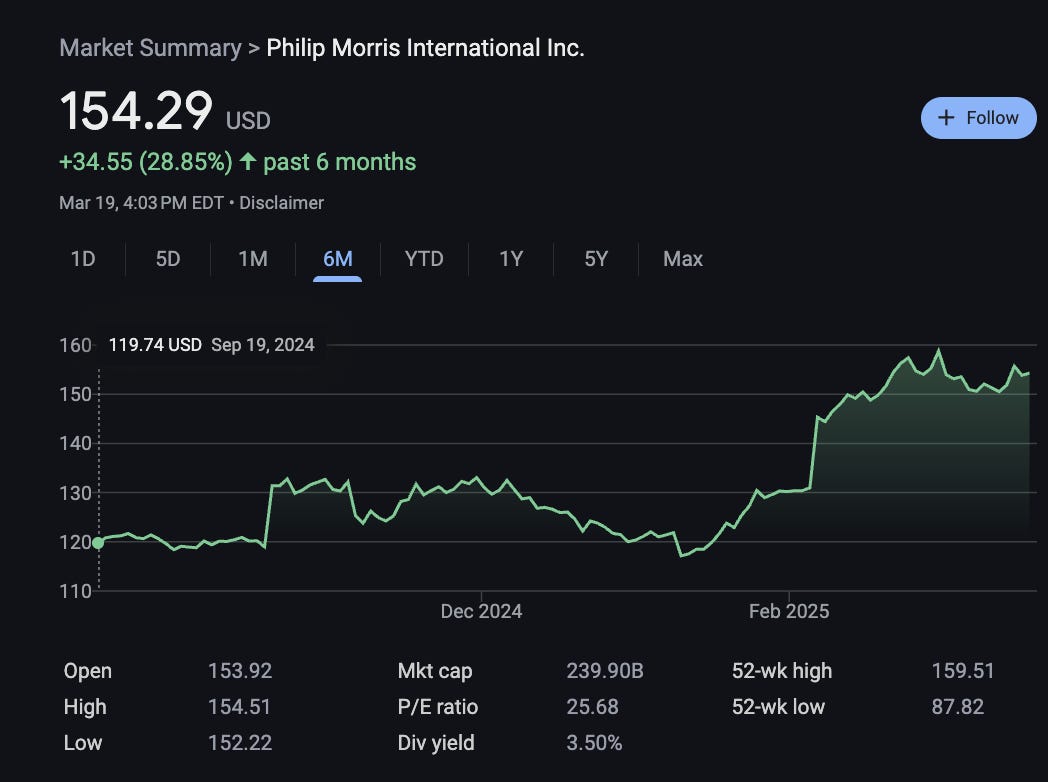
The cutest store and the cutest vehicle are doing the darn thing. Free People is partnering with Moke to offer free rides between their two Palm Beach stores. The Moke is a small, open-air electric beach car with a vintage vibe. Originally a failed military project, it became a resort icon. The modern version is fully electric, with a modest range and speed, designed for fun, not performance. Pricey but sooooo adorable, it’s all about the vacation feel. The service with Free People runs from March 17 to 23 and March 31 to April 6 during store hours. I’ve been noticing quite a few retail stores stepping up their hospitality game; will report back with more. (Instagram)
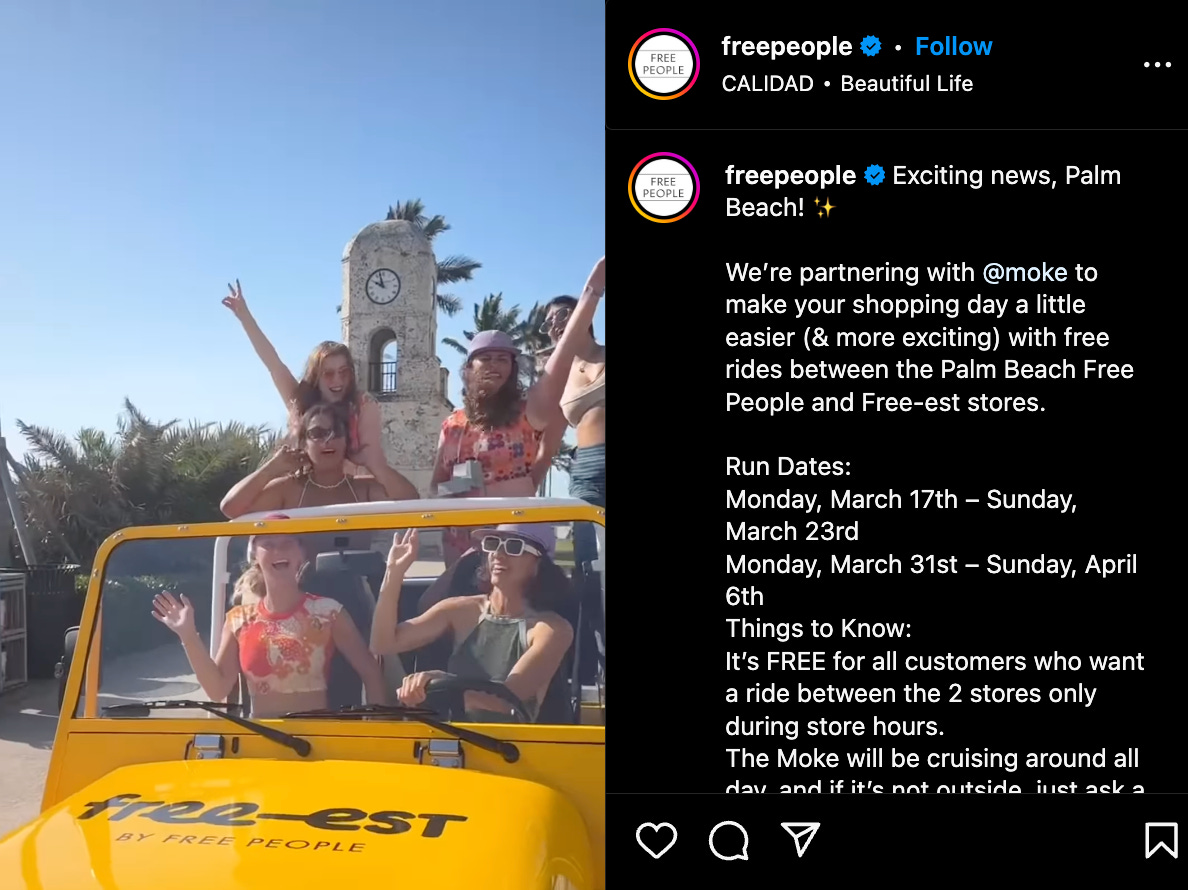
Fever-Tree is launching a Blood Orange Gin Spritz with Margot Robbie’s Papa Salt Gin. The 5% ABV cocktail, made with Fever-Tree’s Blood Orange Soda, will hit Waitrose and Sainsbury’s in April for £2.90 per can. It’s part of the growing spritz trend, with a summer marketing push that includes PR, influencers, and festival activations. This follows Fever-Tree’s £71M deal with Molson Coors for U.S. distribution. Fever-Tree is big with the gin & tonic crowd, but the company’s ginger beer is the most popular product in my fridge, thanks to being the key ingredient for a Moscow mule. (The Grocer)
Calling all remote workers: Looking to move? Want $5,000? Cities in states like Indiana, Kentucky, and Mississippi are calling your name. Amid rising costs in major cities, small towns are paying to attract new residents through programs like MakeMyMove, which aim to help towns recruit remote workers and families seeking more affordable, community-oriented lives with a better quality of life. Cities such as Noblesville, IN, provide perks like coworking memberships and wellness stipends, while others offer unique incentives like locally sourced food. Millennials (obviously) are leading the shift, drawn to lower housing costs and stronger local communities. Despite some corporate return-to-office mandates, demand for these relocation programs remains strong. If you or someone you know has done one of these programs, I would love to chat about it. (Fortune)
Thanks for reading Braun & Brains! Subscribe for free to receive new posts and support my work.
Reply